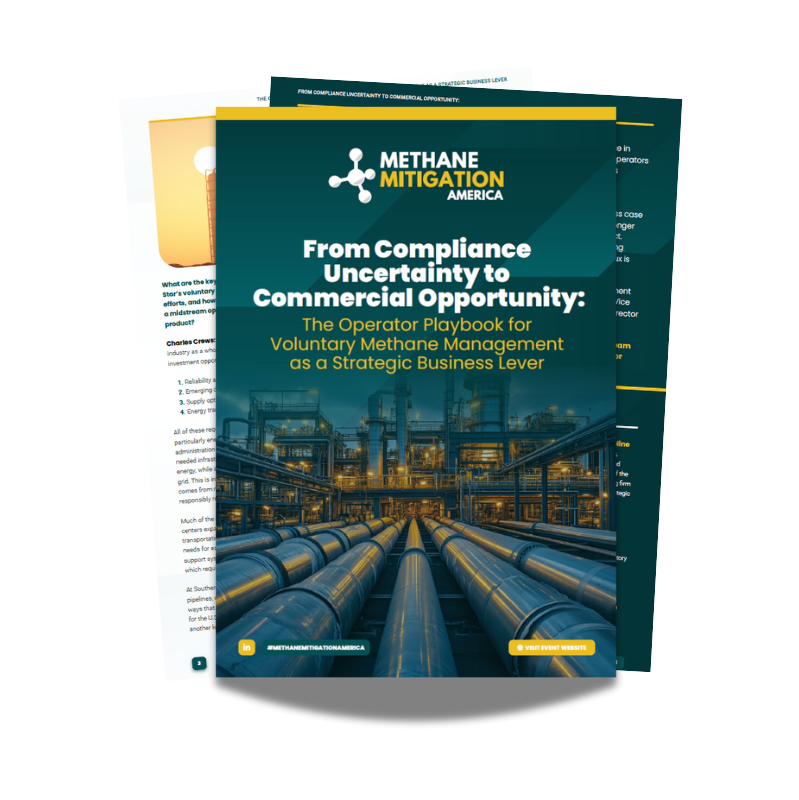Interview

The Operator Playbook for Voluntary Methane Management as a Strategic Business Lever
As rules and markets change, leading oil and gas operators are proving that cutting methane emissions isn’t just about compliance, it’s smart business.
The Operator Playbook for Voluntary Methane Management as a Strategic Business Lever shows how companies like Southern Star Central Gas Pipeline and Expand Energy Corporation are using methane reduction to improve efficiency, safety, and sustainability while saving costs and building trust with stakeholders.
Through examples and insights shared, the playbook highlights practical steps - from new technologies to employee engagement - that make methane management a driver of performance and resilience.
Learn how proactive methane strategies can help operators stay competitive, meet investor expectations, and prepare for the future of low-carbon energy by downloading your copy today.

How Northeast Natural Energy Achieved an “A” Grading from MiQ
Seeking to achieve independent certification of natural gas production, Northeast Natural Energy is the first U.S. natural gas producer to receive the EO100™ certification and the first company in the Appalachian region to achieve an "A" rating from MiQ for almost its entire production. An "A" rating signifies a methane intensity of 0.05% or less, along with the highest scores in company practices and the use of monitoring technology.
MiQ is a global leader in emissions certification, and offers a market-based approach to rapidly reduce methane emissions across the natural gas sector.
In this exclusive interview, B.J. Carney, Vice President Geoscience & Innovation at Northeast Natural Energy shares how reporting requirements for MiQ align with the US’s newly proposed methane regulation and offers best practice advice for other operators facing challenges similar to NNE in emissions data management and compliance.
Download your copy of Setting the Standard: How Northeast Natural Energy Achieved an “A” Grading from MiQ today.

The Orphaned Wells Program: Understanding the Funding Allocation, Challenges and Environmental Impact
For more than 100 years, millions of wells have been drilled across the United States to extract oil and gas. These wells have now led to an inordinate number of “abandoned” or “orphaned” wells, posing a significant risk to the environment and the health of neighbouring communities, while contributing uncontrolled greenhouse gas emissions to the atmosphere.
An orphaned well refers to a well that has no responsible operator, leaving the financial responsibility to plug and remediate the wells to local, state, or federal agencies. In response to the risks posed, President Biden’s Bipartisan Infrastructure Law has directed the Secretary of the Interior to establish programs to inventory and properly close orphaned wells, allocating a historic investment for the program’s effective implementation.
Ahead of her keynote presentation at the Methane Mitigation America Summit in Houston, from 5-7 December, on ‘Establishing the Orphaned Wells Program’, we sat down with Kimbra Davis, Director of the Orphaned Wells Program Office, Department of the Interior, for an exclusive interview. Acting as the driving force behind the program, Kimbra shares valuable insights into the program’s alignment with global environmental and energy policy goals, the funding allocation, and the challenges it may face.

Leading ESG Investments and Methane Mitigation at Quantum Capital Group
In recent years, private equity is becoming an increasingly powerful change agent for driving progress on ESG, climate progress and sustainability.
Founded in 1998 and based out of Houston, Texas, Quantum Capital Group is a leading private equity capital firm that invests in the energy industry, with a focus on oil and gas, and more recently investing in renewables and the energy transition.
Ahead of her panel at the Methane Mitigation America Summit, we sat down with Keila A. Diamond, Managing Director, and Head of ESG, Quantum Capital Group to discuss the growing importance of ESG considerations, what Quantum regards as best practice for methane emissions reporting and mitigation, and why good methane data matters for investors. Keila also shares an example of successful ESG initiatives that Quantum Capital Group has been involved in and her thoughts on the upcoming Methane Mitigation America Summit.

Designing out Methane Emissions at TotalEnergies
TotalEnergies has signed on to tough new targets to reduce methane emissions by 80% and flaring to zero by 2030. How do they expect to achieve it?
We sat down with David Mendelson, President & CEO at TotalEnergies E&P Americas to find out...
“It’s part of our daily work now. Reducing emissions is given equal importance to everything we do in our operations” explains David.
In this interview, David Mendelson discusses the company’s approach to reducing the methane intensity in existing and new production assets, his thoughts on the energy transition and how the company folds emissions reduction into its daily operations. Access your free copy of the interview today.
Not to be missed, David also discusses:
- How TotalEnergies is creating more energy from a greater diversity of energy sources
- The journey so far to lower carbon and lower methane intensity in TotalEnergies' operations
- The role of the Operations team in lowering emissions
- The biggest challenges that confront the industry in meeting methane emissions goals
Read the interview in full today!



